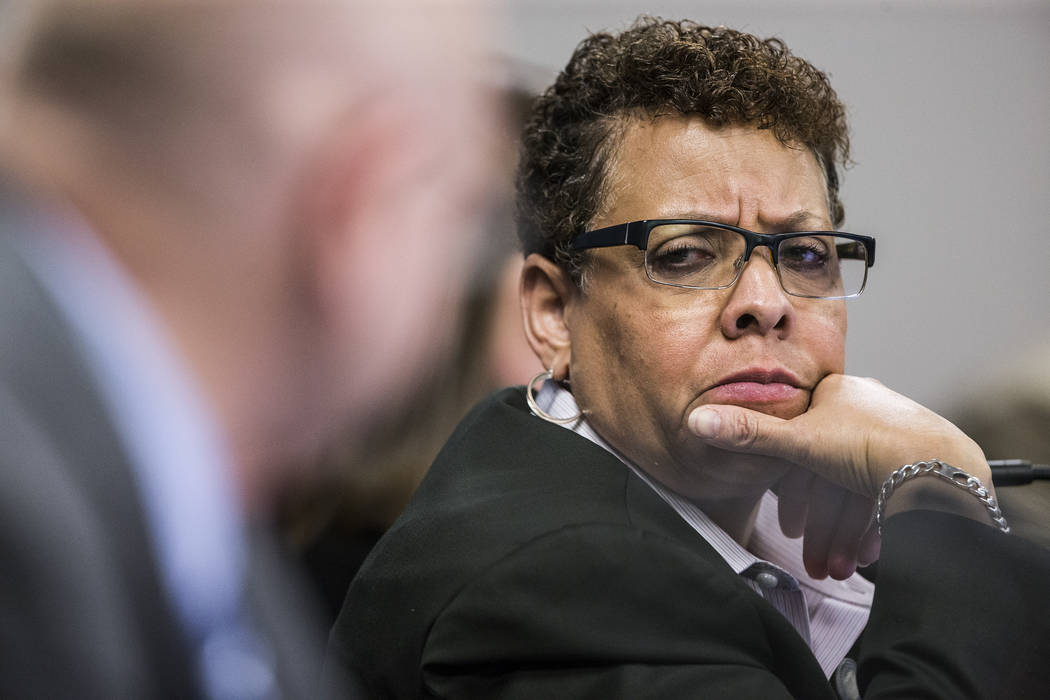Suicide rate for Nevada children, teens nearly doubled in 2018
The suicide rate among Nevada children and teenagers nearly doubled between 2017 and 2018, according to the state’s Office of Suicide Prevention.
In 2018, 27 children and teens died by suicide, state data released Friday show. Fifteen died by suicide in 2017; in 2008, that number was six.
In Clark County, 19 children under 17 died by suicide last year, compared to 10 in 2017.
“This issue is increasing and comprehensive suicide prevention is important,” Misty Vaughn Allen with the suicide prevention office testified at a state Senate committee hearing. “Any adult working with youth needs to be aware what to look for.”
The suicide prevention office will form a team to investigate the increase, Richard Egan, a spokesman for the office, said in an email Friday.
The increase in suicide among children and teenagers was in contrast to the rates for other age groups, all of which decreased or remained steady in 2018 over the previous year.
According to the suicide prevention office, suicide among minors is becoming more prevalent nationwide. About 2.4 per 100,000 children and teens died by suicide nationwide in 2017, the most recent data provided by the Centers for Disease Control and Prevention. In Nevada, that rate was 2.6 per 100,000, according to the CDC.
The state calculates its rate differently, excluding residents who die outside the state. Using its figures, Nevada’s rate was 2.1 per 100,000 children and teens in 2017, vs. a rate of 3.8 per 100,000 in 2018.
Searching for trends
“There is rarely one single event, behavior, or risk factor that can explain this increase, though state child fatality review teams and the Committee to Review Suicide Fatalities seek to find trends and areas for improved communication and prevention across systems,” a release from the suicide prevention office said.
Nevada ranks sixth nationwide for its overall suicide rate, according to the CDC. It’s the seventh leading cause of death in the state.
The Office of Suicide Prevention said in its release it would work with the state Department of Education and Division of Public Safety to apply for a second round of federal funding through Project Aware, which would allow the state office to distribute mental health resources to schools.
The state also uses a program called SafeVoice which lets bystanders anonymously report through a phone call, text or online when they feel their safety or the safety of others is at risk.
Word of the sharp climb in suicides among young Nevadans came at a hearing Friday in Carson City for Senate Bill 204 before the Education Committee. The bill, introduced by state Sen. Pat Spearman, D-North Las Vegas, would require all Nevada school districts to adopt policies related to suicide prevention and intervention. Those policies would have to address suicide prevention for higher risk populations, including teens with mental illness and disability and LGBTQ students.
About 16 percent of high school students in Nevada have seriously considered suicide, according to the 2017 Nevada Youth Risk Behavior Survey. About 8.5 percent made an attempt.
“Clearly, we have disaffected young people who do not see any support system available to them,” Spearman said.
Drugs, alcohol, not counseling
She was joined by Colyn Abron, a state youth legislator from Clark County, who read from a suicide note he wrote but did not act on. He said he sees his peers turning to drugs and alcohol instead of counseling to cope with mental illness.
“Many students lack the resources and the support system and the education to reach out for help,” he said.
The bill would require teachers and students to be trained on the mental health resources available at school and in the community. It would also necessitate counseling for students and staff impacted by a completed or attempted suicide by a peer and would require schools to reach out to community organizations that could assist with a response.
Suicide prevention policies would vary by school district and between public and private schools, Spearman said, depending on the culture and needs of that school. She rejected suggestions from legislators and opponents of the bill that private schools would be required to teach ideology around sexual orientation they may not agree with or risk losing their licenses.
“Not saying the words does not mean that you don’t have children in those schools who need this service,” she said. “We’re in the 21st century. We have to recognize this.”
Contact Jessie Bekker at jbekker@reviewjournal.com or 702-380-4563. Follow @jessiebekks on Twitter.
Warning signs of suicide
A person with suicidal thoughts might talk about wanting to die, feeling hopeless or trapped. They may say they want to kill themselves or that they feel they are a burden to others.
Other warnings of suicide include alcohol and drug abuse, acting anxious, agitated or showing rage. Extreme mood swings, sleeping too little or too much and withdrawing from interactions with others can also be warning signs.
If you know someone at risk of suicide, don't leave them alone. Remove any substances, like drugs and alcohol, and firearms from their vicinity.
Then call the National Suicide Prevention Lifeline at 800-273-8255 or the Nevada Crisis Line at 775-784-8090. Both are available 24/7.
Nevada 211 can provide resources and referrals 24/7. The service can be reached by dialing 211 or texting your zip code to 898211.
To reach the state SafeVoice program, call 833-216-7233 or safevoice.com.
Finally, a person in danger can be taken to the emergency room or can seek guidance from their mental health or medical provider.






















